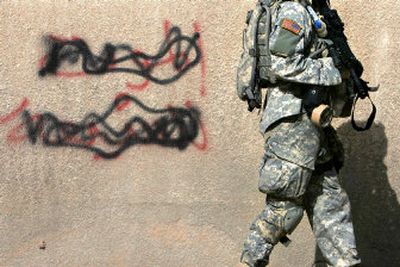Threats drive out Shiites

BAGHDAD, Iraq – The man strapping the air conditioner to the top of a taxi paused to explain: His family was packing up and fleeing their Baghdad neighborhood because of threats against Shiites.
“We are leaving because we are scared,” he said, too afraid to give his name. “This is a dangerous area.”
Full-scale civil war may not have broken out in Iraq, but startling signs of sectarian hatred are evident along several streets in the religiously mixed Dora neighborhood.
While Shiite families leave Dora, Sunni politician Adnan al-Dulaimi is accusing government forces and Shiite militias of “ethnic cleansing” against Sunni communities – including in Azamiyah, where residents clashed Tuesday with Iraqi forces they feared were clearing the way for Shiite death squads.
In Dora these days, rows of homes sit empty and abandoned. The streets show signs of desperate attempts to craft barriers from palm tree trunks and rusty washing machines. There are countless crude threats scrawled in black spray paint.
Gone are the packs of curious children who often trail American soldiers and the clusters of neighbors usually found socializing outside on hot weekend afternoons.
A handful of the remaining Shiite families on one block said those who had fled were heeding warnings from Sunni Arab insurgents, gesturing to the death threats painted along the streets. Most were too scared to give their names.
“This is just one block. Imagine all the activity elsewhere,” said Staff Sgt. Feliciano Cruz, estimating that 10 percent to 15 percent of homes in areas he patrols have been vacated. “I don’t see it calming down anytime soon.”
In the western part of Dora, once a bustling community of about 500,000 Sunnis, Shiites and Christians with a Sunni majority, more than 100 Shiite residents have recently fled one small neighborhood, according to U.S. soldiers. Sectarian violence is better contained in the more affluent eastern section of Dora.
Elsewhere across the country, Iraqi officials estimate tens of thousands have been displaced – the majority of them Shiites but also Sunnis and Christians who have left mixed areas for the relative safety of communities dominated by Iraqis from their sect.
The sectarian fighting has handed American troops in Dora a mission different from simply hunting down the insurgents. Now, they count the number of abandoned homes and search for those trying to foment civil strife. Sometimes U.S. troops patrol with Iraqis from the Interior Ministry, to whom the U.S. command hopes eventually to hand security responsibilities.
Some U.S. commanders say Iraqi troops can better contain sectarian violence because they are familiar with neighborhoods and local customs. But U.S. soldiers acknowledge that many Iraqis distrust the Interior Ministry forces. Until a recent influx of Sunni recruits, the Iraqi forces in this area were 97 percent Shiite and allegedly operated death squads targeting Sunnis.
On one recent patrol, U.S. soldiers peeked into each courtyard to see which homes were deserted, spray painting symbols on empty homes to be checked later to prevent insurgents from using them as hideouts.
“We’re supposed to identify all abandoned homes. There’s still a lot of empty homes that we haven’t hit,” said Cruz, of San Antonio, as he pushed his soldiers from the 2nd Battalion, 506th Regimental Combat Team, 101st Airborne Division down the street.
He added: “In all the ones we’ve found abandoned, we haven’t found a Sunni one. They were all Shiite.”
All sects in the area – once a close-knit, middle-class community of villas and smart shops – have been affected by the violence, U.S. soldiers say.
At least one Assyrian church bears signs from a car bombing, and several mosques, even those in quieter parts of Dora, have concertina wire strung in front. Some have sandbagged bunker positions on their rooftops.
Farther down the street, Cruz met another Shiite family that was packing belongings they left behind when they first fled.
“We left our house two months ago for security reasons,” explained Hussein, a mustached man from the Khalidi tribe whose wife asked that their surname not be used. “I have three daughters and no sons. I want to save my family.”
The threats that had persuaded the family to flee were still prominently displayed. Some messages were as simple as “Death to Shiites.” Many insulted Shiite clerics. Others were slurs against Interior Ministry commandos.